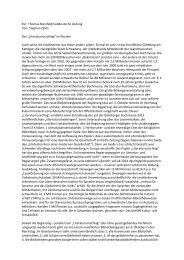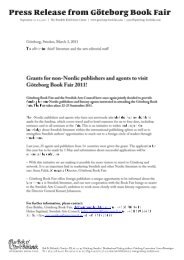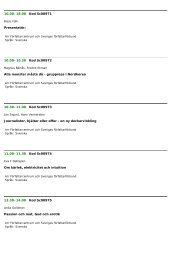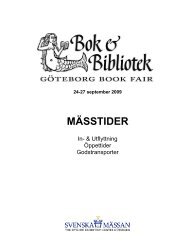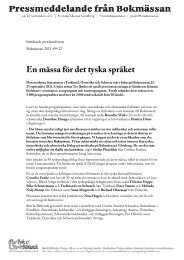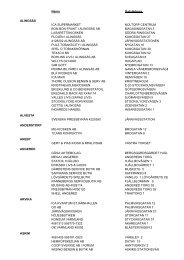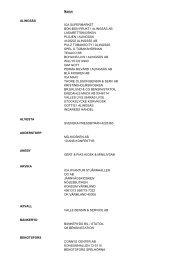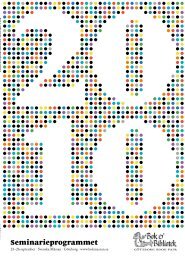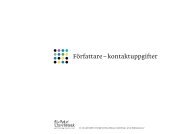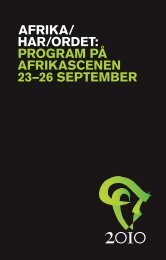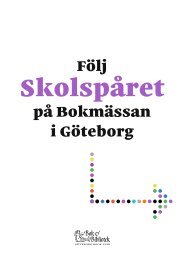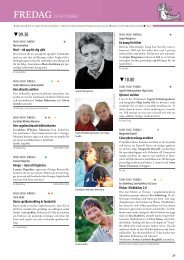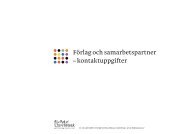PDF-document, 3,5 MB - Bok & Bibliotek
PDF-document, 3,5 MB - Bok & Bibliotek
PDF-document, 3,5 MB - Bok & Bibliotek
You also want an ePaper? Increase the reach of your titles
YUMPU automatically turns print PDFs into web optimized ePapers that Google loves.
thursday<br />
september 22<br />
Photo: Jürgen Bauer<br />
Photo: Peter von Felbert<br />
Photo: Jenny Posener<br />
Felicitas Hoppe Anna Mitgutsch Alan Posener<br />
10.00–10.45 Code To1000.5<br />
Cristina Allemann-Ghionda<br />
Can Intercultural Education<br />
contribute to equal opportunities<br />
Intercultural Education (IE), a concept used in<br />
europe since the mid-1970s, is currently defined<br />
by many scholars as a comprehensive educational<br />
approach. Firstly, IE is meant to address all students,<br />
and not only those who are seen as different<br />
from a given cultural or ethnic majority or social<br />
group. Secondly, IE is concerned not only about<br />
acknowledging cultural or ethnic differences and<br />
integrating minorities or migrants, but also about<br />
recognizing, respecting and including all facets<br />
of diversity. Thirdly, it is difficult to conceive of<br />
implementing IE in school systems which are not<br />
comprehensive, but which practice early selection<br />
and tracking. Indeed, empirical comparative<br />
data reveal that in many countries, certain social<br />
and ethnic groups do not have equal opportunities<br />
in education, even if IE (or a similar concept) is<br />
declared a policy goal and is included in curricular<br />
guidelines. The question then remains: Can intercultural<br />
education (or an education committed<br />
to an inclusive treatment of diversity) contribute<br />
to improved educational opportunities and higher<br />
achievement In pursuing possible responses<br />
to this question, Cristina Allemann-Ghionda,<br />
Professor of Comparative Education at the University<br />
of Cologne, analyzes structural and curricular<br />
conditions conducive to IE as well as putting forth<br />
examples of best practice.<br />
Moderator: Rasoul Nejadmehr, Consultant, Intercultural<br />
Affairs, Kultur i Väst.<br />
Language: English.<br />
In coop with Kultur i Väst – Network for Intercultural Education<br />
11.00–11.45 Code To1100.6<br />
Felicitas Hoppe, Peter Stamm, Anna Mitgutsch,<br />
Peter von Matt<br />
Three countries, one language<br />
– three countries, one literature<br />
What does the shared language mean for literature<br />
in Germany, Switzerland and Austria Is it valid to<br />
talk about a German language literature, in spite<br />
of all the differences that can be found within<br />
the common language, or should you rather talk<br />
about three independent forms of literature What<br />
are the similarities and differences in language and<br />
literature between the three German-speaking<br />
countries These matters will be discussed by Felicitas<br />
Hoppe, Germany, Peter Stamm, Switzerland,<br />
and Anna Mitgutsch, Austria, together with<br />
Swiss Literature scholar Peter von Matt.<br />
Moderator: Monica Nagler-Wittgenstein, cultural<br />
journalist.<br />
Language: German. Interpreted into Swedish.<br />
In coop with Three countries – one language<br />
13.00–13.20 Code To1300.8<br />
Andrej Chadanovitj, Ola Larsmo<br />
PEN and Belarus<br />
Andrej Chadanovitj, Chair of Belarusian PEN, and<br />
Ola Larsmo, Chair of Swedish PEN, discuss the<br />
situation in Belarus, and the way the two sister<br />
organisations work individually and together for<br />
freedom of expression.<br />
Language: Belarusian. Interpreted into Swedish.<br />
In coop with Swedish PEN and Swedish Arts Council<br />
13.00–13.45 Code To1300.2<br />
Alan Posener, Ulla Gudmundson, Werner G Jeanrond,<br />
Ulf Jonsson<br />
The contrary Pope<br />
The Vatican and its war against modern society<br />
He is the spiritual leader for more than a billion<br />
people. But the years as head of the Roman<br />
Catholic Church have not been unproblematic.<br />
Pedophile scandals and controversial statements<br />
have shaken the church. Now grassroots voices are<br />
challenging Benedict XVI to listen to their demands<br />
for reform. Does the Vatican want this Will it tolerate<br />
it The German-British author and journalist<br />
Alan Posener argues that the Pope is running a<br />
crusade against modern society, and that he supports<br />
a Christian fundamentalism which is on a par<br />
with Islamic fundamentalism. Posener talks with<br />
Ulla Gudmundson, Ambassador to The Holy See,<br />
Professor Werner G Jeanrond, and Ulf Jonsson,<br />
Editor-in-Chief for Signum.<br />
Moderator: Ola Sigurdson, Professor of Systematic<br />
Theology.<br />
Language: English.<br />
In coop with Ica <strong>Bok</strong>förlag, Signum, Swedish Ministry for Foreign<br />
Affairs and Behold Man/Church of Sweden<br />
10



